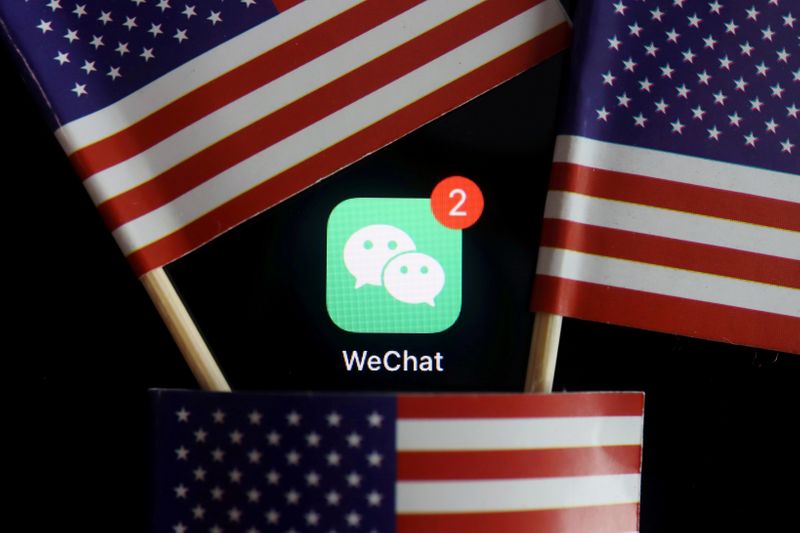By David Shepardson
WASHINGTON (Reuters) - The U.S. Justice Department asked a federal judge in San Francisco on Friday to allow the government to bar Apple Inc (O:AAPL) and Alphabet Inc's Google (O:GOOGL) from offering WeChat for download in U.S. app stores pending an appeal.
The filing asked U.S. Magistrate Judge Laurel Beeler to put on hold her preliminary injunction issued Saturday. That injunction blocked the U.S. Commerce Department order which was set to take effect late on Sept. 20 and that would also bar other U.S. transactions with Tencent Holding's (HK:0700) WeChat, potentially making the app unusable in the United States.
Beeler responded late on Friday by setting a hearing for Oct. 15 on the motion but said she could potentially hold it on "a tighter time period."
The Justice Department filing said Beeler's order was in error and "permits the continued, unfettered use of WeChat, a mobile application that the Executive Branch has determined constitutes a threat to the national security and foreign policy of the United States."
Tencent had put forward a "mitigation proposal" that sought to create a new U.S. version of the app, deploy specific security measures to protect the new apps source code, partner with a U.S. cloud provider for user data storage, and manage the new app through a U.S.-based entity, the filing said.
However, its proposal still allowed Tencent to retain ownership of WeChat and did not address U.S. concerns over the company, it added.
Tencent declined to comment.
Lawyers for U.S. WeChat Users Alliance, the group behind the legal challenge to the WeChat ban, questioned the urgency of the government's request, noting the time it took for the government to seek a stay.
"The government’s decision to sit tight for five days shows that there is no emergency," they wrote.
In support of its argument, the Justice Department made public portions of a Sept. 17 Commerce Department memo outlining the WeChat transactions to be banned. "The WeChat mobile application collects and transmits sensitive personal information on U.S. persons, which is accessible to Tencent and stored in data centers in China and Canada," the memo said.
Beeler said WeChat users who filed a lawsuit "have shown serious questions going to the merits of the First Amendment claim."
The Justice Department filing said "the First Amendment does not bar regulation of WeChat simply because it has achieved the popularity and dependency sought by (China), precisely so it can surveil users, promote its propaganda, and otherwise place U.S. national security at risk."
WeChat has had an average of 19 million daily active users in the United States, analytics firms Apptopia said in early August. It is popular among Chinese students, Americans living in China and some Americans who have personal or business relationships in China.
Beeler wrote "certainly the government’s over-arching national-security interest is significant. But on this record — while the government has established that China’s activities raise significant national security concerns — it has put in scant little evidence that its effective ban of WeChat for all U.S. users addresses those concerns."
WeChat is an all-in-one mobile app that combines services similar to Facebook (NASDAQ:FB), WhatsApp, Instagram and Venmo. The app is an essential part of daily life for many in China and boasts more than 1 billion users.

TikTok on Wednesday sought a similar preliminary injunction from a U.S. judge in Washington. A judge on Friday said he would hold a hearing Sunday morning about whether to halt the U.S. app store ban on new TikTok downloads set to take effect Sunday night.